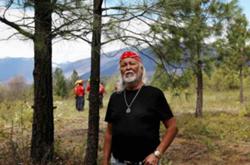- The Age of Insecurity: Coming Together as Things Fall Apart
- House of Anansi Press (2023)
Fear has marked major portions of my life. Money, work, even relationships. Fear of being poor, of losing my job, of not having a place to live, not being able to make it in this increasingly difficult city. It’s an interesting thought exercise to look back at decisions I took in service of this fear and wonder what might have happened if I hadn’t been directed, driven and corralled by the forces of insecurity.
This idea surfaced with increasing significance throughout Astra Taylor’s recent CBC Massey lecture in Vancouver. Taylor is a proper polymath: she’s a filmmaker, writer, activist, musician and all-round cool human being. A founder of the Debt Collective in the United States, she has been immersed in different forms of community organizing since she was a kid and took up the cause of animal rights in elementary school.
When Taylor was tapped to give the 2023 Massey Lectures, she leapt in with alacrity. The time frame for producing the acclaimed, anticipated national lecture series was, to put it mildly, a bit brutal. She started writing in January, finished in June and went on tour, giving a series of five lectures across Canada throughout September. The tight time frame meant that if she had only a week to write a draft of a chapter, “that meant I really only had a week,” she laughs. “I was quite stressed.”
Established in 1961, the Massey Lectures are a collaboration between CBC, Massey College and House of Anansi Press. The lecture series takes its name from Vincent Massey, former governor general of Canada and founder of the college that bears his name.
The Massey Lectures are a particularly suitable platform for the social critique that is Taylor’s forte: a vivid mixture of memoir, analysis and something more utopic in vision.
She comes by this combination honestly, a child of parents who afforded her a degree of freedom and self-determination when it came to managing her own education. “Unschooling” is one of the many subjects that Taylor has tackled in her career. The concept of democracy, from its very beginnings to its current embattled existence, is another.
In addition to directing extraordinary documentaries like 2008’s Examined Life, Taylor is also the author of 2014’s The People’s Platform: Taking Back Power and Culture in the Digital Age and 2019’s Democracy May Not Exist, but We’ll Miss It When It’s Gone.
We caught up on the phone after Taylor gave her final Massey lecture in Toronto’s Koerner Hall, a suitably grand venue for her expansive ideas. The lecture series is done, but Taylor is still busy, and we talked as she made her way across the city to yet another commitment.
In 2023’s The Age of Insecurity: Coming Together as Things Fall Apart, the book that accompanies the Massey Lectures, Taylor blends personal experience, philosophical queries and cogent analysis to assail some of the largest issues of the day, fear being one of them. Insecurity takes as its premise the way that capitalism has systematically undermined human existence. As Taylor makes clear in her book, “undermined” might not be a sufficiently encompassing description — “hollowed out,” “eaten alive,” “enslaved to Moloch” may be more apt.
The enclosure of the commons and the Charter of the Forest
How exactly we came to be in this place is a bit of a journey. In retracing the path that much of human society has taken, Taylor takes us back to jolly old England, specifically the enclosure of the commons, a process that was undertaken over the course of thousands of years. Enclosure meant the erasure and obliteration of the ancient rights to collect firewood, gather food and graze livestock: stuff that allowed ordinary people to exist.
It wasn’t until 1215 that there was something of a revolt against the winnowing down of access to the commons. Curiously enough, it originated not with poorer folk but with the aristocracy who kicked up dirt and forced England’s King John to renege on some of the more draconian aspects of enclosure. The result of this insurrection was the Magna Carta and its sister document, the Charter of the Forest.
Prior to the enclosure and the privatization of what had formerly been free and open to everyone, common folk could eke a living from the land by hunting, fishing and foraging. But the removal of this shared resource forced people out of their traditional ways of living. To survive, suddenly people needed jobs. With this came bosses, and the constant, ubiquitous threat of losing one’s means of living. Fear, in other words, became the coin of the realm.
As Taylor asserts in prose that is both precise and pellucid, from this point in history arose many of the things that we’re still enduring. Shitty jobs, the crushing oppression of capital, money as the ultimate arbiter of value. As people drifted to the city in search of employment, slums arose alongside factory work, and a list of social ills blossomed like so many rotten flowers.
Capital has taken on a particular metastatic aspect in recent years, as the accumulation of wealth has reached heights that far surpass that of ancient kings. So at this point in human history, when inequality and injustice have never been so entrenched and catastrophic, has the time finally come for a return of the ancient rights embodied in the Magna Carta and the Charter of the Forest? Can I get a hell, yeah?
Collective action in action
As Taylor writes: “A revival of the commoners’ perspective is long overdue. Updated for our present age, the ancient idea of the right to the commons embraces security not as any one single thing, but rather as a bundle of entitlements that, together, help ensure individual and collective well-being. Security, in this holistic understanding, includes civil and political rights (negative rights) as well as their economic and social counterparts (positive rights): the right to a decent home; to medical and mental health care; to education; to support in disability and old age; to meaningful and remunerative work; to a healthy and hospitable environment, and so forth.”
On paper it all looks extremely reasonable. One of the benefits of Taylor’s work is the clarity of her writing. In this aspect, she reminds me of public intellectuals like Stuart Hall, who expressed complex ideas in language that was meant to be accessible and clear to anyone.
In this way, the Massey Lectures themselves similarly offer up a place for the open exchange of ideas. Widely accessible in book, lecture or broadcast form, the talks are a reminder of collective action in action. The list of writers and thinkers who have participated is truly dizzying, ranging from Martin Luther King Jr. to Doris Lessing to John Ralston Saul. It’s a pretty intimidating collection, and for someone like Taylor who identifies as an introvert, the idea of taking one’s place in this august group is more than a little terrifying. Of agreeing to take on this assignment, she says, “I don’t know why my current self thinks that my future self isn’t an introvert.”
It’s an unusual experience to simply sit and listen to someone talk for an hour. As Taylor explains, her mantra in undertaking the lectures was “to not waste anyone’s time. It’s such a gift people are giving to me, the gift of their attention.” There is a big difference between spoken language and the written word; what looks reasonable on the page can prove impossible to say with ease and fluidity. She credits the CBC Ideas team, who are experts at imparting audio information, as well as theatre training from the producers.
The search for solidarity
Following the Massey lecture, I had the opportunity to read Kim Stanley Robinson’s much-vaunted 2019 science fiction novel The Ministry for the Future, which includes some ideas formulated by the Debt Collective of which Taylor is a founding member.
In reading about Ministry, I fell a little bit down the rabbit hole of economic theory. It’s something of an endless information pit. I wasn’t sure if I fully understood the concepts and ideas under discussion, but the overall tone from many recent talks and interviews was that the current system was a death spiral, not only for humanity but everything else on the planet. Some folks are a little more hopeful about the possibility of turning the ship around. Others, not so much.
Robinson is clear about the need for new ideas. Ministry is a prescient work of fiction that covers carbon coin, radical new ways of combating climate change, and standing off the worst of the sixth mass extinction event. Many of the terms that he uses also occur in Taylor’s work. Principal among them: solidarity.
Doing things in isolation as an individual has little effect on the larger issues, but collective action is different. Insecurity pits people against each other, placing them in direct competition for jobs, resources, status, etc. Since insecurity has been used as a wedge, hammer and battering ram to break up collective action, do you need to get rid of it first in order to bring folks together?
As Taylor explains, insecurity and its attendant emotional devastation (fear, shame, humiliation) can actually be a means to unite people.
In her work with the Debt Collective, she describes the effect of people sharing their fears as opposed to living in secret shame: “Inspired by the feminist consciousness-raising circles of the 1970s, we often host what we call debtors’ assemblies: forums where people share their financial woes. Without fail, some people cry. They also find life-changing strength and camaraderie. In these sessions, insecurity becomes a gateway [to] how participants understand themselves and the wider world.”
Here’s another challenge. Organizing with other humans is not the easiest thing. As Taylor said in her talk in Vancouver, there isn’t a day that goes by when she doesn’t complain about the Debt Collective. On the nature of community organizing, she explains, “People are difficult. It’s not all flowers and rainbows. You’re not there to make friends but to find collaborators.” It’s not a party, but an ongoing and protracted kind of negotiation and activation.
For those of us who are conflict averse and tend to flee at the first indication of disagreement, getting in there and getting your hands dirty can prove difficult. But the process of duking it out can result in truly miraculous stuff. And if ever there was a moment that people need to come together, it is now. Right now.
Resisting the ideology of isolation
“Another world is possible,” wrote poet, organizer and artist Aurora Levins Morales in her famous poem "V’ahavta." So how do we get there? In The Age of Insecurity, Taylor posits what she calls “a care economy.” It requires as many people as possible to jump on board and work collectively for a future that works for all beings.
“For decades, progressive organizers have been working to advance a different paradigm, one that resists the ideology of isolation by acknowledging the fact of our interdependence,” Taylor writes in her book. “There are nurses, teachers, and domestic workers mobilizing for better wages, and environmentalists fighting to decarbonize our societies. The essential and life-sustaining labour of caring for people and planet, they argue, cannot be automated or outsourced, which means that care work has the potential to be the meaningful, well-compensated, and secure work of the future.”
Solidarity, the act of taking care, the freedom to live without fear, division, violence and hatred: you would think this would be a world that all people wanted. But of course, it’s never that simple. But to quote Taylor’s friend and fellow writer Rebecca Solnit, “Hope is not a lottery ticket you can sit on the sofa and clutch, feeling lucky. It is an axe you break down doors with in an emergency.”
We are very much in that state of emergency. It’s an all-hands-on-deck situation. Wartime footing. A race to save the planet. In the clarion call that another world is indeed not only possible, but critical, and a way for humanity to pull out of its current nosedive towards total annihilation, The Age of Insecurity is exactly the right book at exactly the right time. That time is now.
Astra Taylor’s CBC Massey Lectures will be broadcast on CBC 'Ideas' in November. ![]()
Read more: Books, Rights + Justice

















Tyee Commenting Guidelines
Comments that violate guidelines risk being deleted, and violations may result in a temporary or permanent user ban. Maintain the spirit of good conversation to stay in the discussion and be patient with moderators. Comments are reviewed regularly but not in real time.
Do:
Do not: